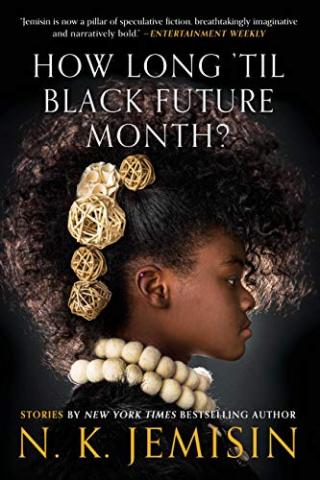
Black Future Month
by Seth Warburton
“How Long ‘Til Black Future Month?” asks author N. K. Jemisin with the title of her 2018 short story collection, though it may seem an odd question to pose here at the beginning of Black History Month. But as Jemisin notes in her introduction, the stories of humankind’s many possible futures are too often written by those with the power in the past. A science fiction story without black people implies that history’s racism will continue into the future. During Black History Month, then, it’s entirely appropriate to envision a future that not only includes black people, but which gives them agency in shaping that future. Here are a few titles to honor the black authors, past and present, who have helped carve a place for black folks in the many futures humanity imagines.
Jennifer Marie Brissett’s debut novel “Elysium” is unexpected and original. Saying more about it, however, is difficult. Adrianne and Antoine inhabit a future city, or perhaps they are Adrian and Antoinette scurrying for survival after a future calamity. Every time the story appears within reach, it shifts away again, looping back on itself with the characters in different relationships, different names, different genders and with society in various states of decline. Each iteration of the story leaves the reader just a bit closer to understanding the story behind the stories. It’s appropriate that it won a special citation from the Philip K. Dick award, for “Elysium” is just the sort of novel that will appeal to fans of the thought-provoking work of classic science fiction authors like Dick or Ray Bradbury.
California in 2024 is a terrifyingly plausible dystopia as envisioned by Octavia Butler in her 1993 novel “Parable of the Sower.” Wracked by climate change and corporate greed, the land is consumed by fire and the people by desperate poverty. Lauren Olamina, a black teenager, is forced to flee northward on foot, the only survivor of her family. As she gathers travelling companions, Lauren also gathers all that she has seen, felt, learned and touched into a new faith, an ethos she calls Earthseed. Accepting that change is inevitable, by embracing it, people may direct it. It is a vision that encompasses both the suffering of the present and the possibility of a utopian future, a future which includes and is shaped by the agency of black people.
I hope you’ll look for these and other stories at Ames Public Library, and consider Black Future Month this Black History Month.